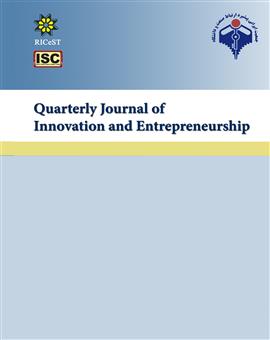Social Entrepreneurship in Higher Education: A Data-Based Study
Subject Areas : عمومىhassan nadalipoor 1 , karimi fariba 2 * , mohammad ali nadi 3
1 -
2 -
3 -
Keywords: Social Entrepreneurship, Higher Education, Data Foundation Theory, Value Creation, Community Responsibility,
Abstract :
Social entrepreneurship as a branch of entrepreneurship has a key role in the sustainable development of society. Higher education, on the other hand, is considered a good course for fostering entrepreneurship. In this regard, the purpose of this study was to identify the components of social entrepreneurship in higher education. The research approach is qualitative and in the research process the strategy of data foundation theory has been used.
آراستی، زهرا، ملکی کرم آباد، محمد مهدی، متوسلی، مسعود. (1391). عوامل نهادي تاثيرگذار بر پيدايش فعالیتهاي کارآفرینانه اجتماعی. توسعه کارآفرینی، سال دوم، جلد پنجم، تابستان 1391، از صفحه 203-185.
2.انسلم استراوس و جولیت کربین.(2008). مبانی پژوهش کیفی. ترجمه ابراهیم افشار (1395). انتشارات نی.
3.تمنا، سعید، صمدی، سمیه (1395). رابطه سرمایه فرهنگی و سرمایه اجتماعی با میزان آگاهی دانشجویان از فرهنگ دانشگاهی. فصلنامه پژوهش و برنامه ریزي در آموزش عالی، دوره 22،شماره1، 1395،
4.بازرگان، عباس.(1395). روش های تحقیق کمی، کیفی و آمیخته. ویراست سوم. انتشارات دیدار.
5.بیرکس، ملانی و جین الیزابت میلز.(2011). تحقیق مبنایی: راهنمای عملی. ویراسته ی هانیه شمس کلاهی. ترجمه ی سیدمحمد اعرابی و عباداله بانشی.( 1393)تهران: دفتر پژوهشهای فرهنگی.
6.زمانی، اصغر.(1396). شناسایی، تحلیل و اولویت بندی عوامل موثر بر کیفیت آموزش در آموزش عالی. فصلنامه علمی و پژوهشی نوآوری و ارزش آفرینی، دوره 6،شماره 11
7.عرب، عباس، آهنچیان، محمدرضا، کارشکی، حسین. (1392). نقش سبک رهبری تحولی مدیران در پیش بینی کارآفرینی اجتماعی کارکنان: مطالعه تطبیقی دانشگاه های دولتی با دانشگاههای غیر دولتی مشهد. ابتکارو خلاقیت در علوم انسانی، پاییز 92، دوره سوم، شماره 2.
8.فراستخواه، مقصود. (1395).روش تحقیق کیفی در علوم اجتماعی. انتشارات آگاه.
9. فراستخواه، مقصود. (1396).گاه و بی گاهی دانشگاه در ایران.انتشارات آگاه.
10.فلیک، اوه. (2006). درآمدی بر تحقیق کیفی. (ترجمه هادی جلیلی،1391). تهران، نشر نی.
11.گال، مردیت، بورگ والتر و گال، جویس. (2004). روش های تحقیق کمی و کیفی در علوم تربیتی و روان شناسی. (ترجمه احمدرضا نصر و همکاران،1392) تهران، انتشارات سمت.
12.یادگار، نسیم، معماریانی، محمد مهدی، صدق آمیز، عبدالرضا. (1392). قصد کارآفرینانة اجتماعی: اثر متقابل نگرش کارآفرینانة اجتماعی، امنيت مالی و سرمایة اجتماعی. توسعه كارآفريني، دوره 7، شماره 3، جلد دوم، بهار .1393
13. Alsaaty, F. M., Abrahams, D., & Carter, E. (2014).Business students’ interests in entrepreneurship and social entrepreneurship at a historically black institution. Journal of Small Business and Entrepreneurship Development, 2, 1–30.
14.Abrams, R. M. (2017). Entrepreneurship: A Real-World Approach. Planning Shop.
15.Andreas, M. R. (2003). Validity and reliability test in case study research: A literature review with “hands-on applications for each research phase, Qualitative Market Research, 6 (2), 75-86.
16.Choi, N., and S. Majumdar. 2014. “Social Entrepreneurship as an Essentially Contested Concept: Opening a New Avenue for Systematic Future Research.” Journal of Business Venturing 29 (3): 363–376.
17.Dees, G. (1998). The meaning of social ntrepreneurship. Kauffman center for entrepreneurial
18.Dobele, L. (2016). A New Approach in Higher Education: Social Entrepreneurship Education. Management, Enterprise and Benchmarking in the 21st Century, 227.
19.Granados, M. L., V. Hlupic, E. Coakes, and S. Mohamed. 2011. “Social Enterprise and Social Entrepreneurship Research and Theory.” Social Enterprise Journal 7 (3): 198–218.
20. Kearney, C., Hisrich, R. D., & Roche, F. W. (2010). Change management through entrepreneurship in public sector enterprises. Journal of Developmental Entrepreneurship, 15(04), 415-437.
21.Kirby, David. (2011). the case for (social) entrepreneurship education in Egyptian universities. Education Training 53 (5), pp, 403-415.
22. López, S. T. Calvo, J. V. P. & García, J. H. (2014). Service-learning as Training for Social Entrepreneurship: An Experience in the University. Procedia-Social and Behavioral Sciences,139, 504-511.
23. Lubberink, R., Blok, V., van Ophem, J., van er Velde, G., & Omta, O. (2017). Innovation for Society: Towards a Typology of Developing Innovations by Social Entrepreneurs. Journal of Social Entrepreneurship, 1-27.
24.Newth, J., and C. Woods.) 2014(. “Resistance to Social Entrepreneurship: How Context Shapes Innovation.” Journal of Social Entrepreneurship 5 (2): 192–213.
25. Pache, A. C., & Chowdhury, I. (2012). Social entrepreneurs as institutionally embedded entrepreneurs: Toward a new model of social entrepreneurship education. Academy of Management Learning & Education, 11(3), 494-510.
26. Peredo, A. M., and M. McLean. 2006. “Social Entrepreneurship: A Critical Review of the Concept.” Journal of World Business 41 (1): 56–65.
27. Punch, K. F., & Oancea, A. (2009). Introduction to research methods in education. Sage.
28. Rosendahl L., Randolph H., Sloof M.V.)2012).: The effect of early entrepreneurship education: Evidence froma randomized field experiment, Tinbergen Instıtute Discussion Papers. p. 40.
29. Salamzadeh,Aidin,Azimi, Mohammad Ali, (2013). Social entrepreneurship education in higher education: insights from a developing country. Int. J. Entrepreneurship an SmallBusiness, Vol. 20, No. 1.
30. Sassmannshausen, S. P., and C. Volkmann. )2016(. “The Scientometrics of Social Entrepreneurship and Its Establishment as an Academic Field.” Journal of Small Business Management 1–23.

